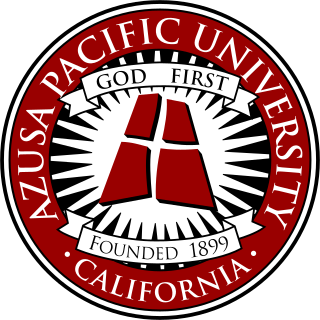Related Research Articles

Washington University in St. Louis (WashU) is a private research university in St. Louis, Missouri, United States. Founded in 1853, the university is named after George Washington, the first president of the United States.

Ferid Murad was an American physician and pharmacologist, and a co-winner of the 1998 Nobel Prize in Physiology or Medicine.

Azusa Pacific University (APU) is a private evangelical research university in Azusa, California. The university was founded in 1899, with classes opening on March 3, 1900, in Whittier, California, and began offering degrees in 1939. The university's seminary, the Graduate School of Theology, holds to a Wesleyan-Arminian doctrinal theology. APU offers more than 100 associate, bachelor's, master's, and doctoral programs on campus, online, and at seven regional locations across Southern California.
The Association of American Medical Colleges (AAMC) is a nonprofit organization based in Washington, D.C. that was established in 1876. It represents medical schools, teaching hospitals, and academic and scientific societies, while providing services to its member institutions that include data from medical, education, and health studies, as well as consulting. The AAMC administers the Medical College Admission Test and operates the American Medical College Application Service and the Electronic Residency Application Service. Along with the American Medical Association (AMA), the AAMC co-sponsors the Liaison Committee on Medical Education (LCME), the accrediting body for all U.S. MD-granting medical education programs.

The National Medical Association (NMA) is the largest and oldest organization representing African American physicians and their patients in the United States. As a 501(c)(3) national professional and scientific organization, the NMA represents the interests of over 30,000 African American physicians and their patients, with nearly 112 affiliated societies throughout the nation and U.S. territories. Through its membership, professional growth, community health education, advocacy, research, and collaborations with public and private organizations, the organization is dedicated to enhancing the quality of health among minorities and underprivileged people. Throughout its history, the NMA has primarily focused on health issues related to African Americans and medically underserved populations. However, its principles, goals, initiatives, and philosophy encompass all ethnic groups
Conceived in no spirit of racial exclusiveness, fostering no ethnic antagonism, but born of the exigencies of the American environment, the National Medical Association has for its object the banding together for mutual cooperation and helpfulness, the men and women of African descent who are legally and honorably engaged in the practice of the cognate professions of medicine, surgery, pharmacy and dentistry.
— C.V. Roman, M.D. NMA Founding Member and First Editor of the Journal of the National Medical Association (NMA) 1908

Alpha Omega Alpha Honor Medical Society (ΑΩΑ) is an honor society in the field of medicine.
Charles R. Drew University of Medicine and Science is a private university in Willowbrook, California, focused on health sciences. It was founded in 1966 in response to inadequate medical access within the Watts region of Los Angeles, California. The university is named in honor of Charles R. Drew.
The Keck School of Medicine of the University of Southern California teaches and trains physicians, biomedical scientists and other healthcare professionals, conducts medical research, and treats patients. Founded in 1885, it is the second oldest medical school in California after the UCSF School of Medicine.
The Doctorate of Medicine and of Philosophy (MD–PhD) is a dual doctoral degree for physician–scientists, combining the professional training of the Doctor of Medicine degree with the research expertise of the Doctor of Philosophy degree; the Ph.D. is the most advanced credential in the United States. Other dual degree programs exist, such as the joint MD–JD degree; both the JD professional degree and the MD are not universally recognized internationally, however. The National Institutes of Health currently provides 50 medical schools with Medical Scientist Training Program grants that support the training of students in MD–PhD programs at these institutions through tuition and stipend allowances. These programs are often competitive, with some admitting as few as two students per academic year. The MCAT score and GPA of MD–PhD matriculants are often higher than MD only matriculants.

The University of California, Los Angeles School of Medicine, also known as the David Geffen School of Medicine at UCLA (DGSOM), is an accredited medical school located in Los Angeles, California, United States. Founded in 1951, it is the second medical school in the University of California system, after the UCSF School of Medicine. The school was renamed in 2001 in honor of media mogul David Geffen who donated $200 million in unrestricted funds.

The University of Kentucky College of Medicine is a medical school based in Lexington, KY at the University of Kentucky's Chandler Medical Center.

The University of Washington School of Medicine is the medical school of the University of Washington, a public research university in Seattle, Washington. According to U.S. News & World Report's 2022 Best Graduate School rankings, University of Washington School of Medicine ranked #1 in the nation for primary care education, and #7 for research.

Carola Blitzman Eisenberg was an Argentine-American psychiatrist who became the first woman to hold the position of Dean of Students at the Massachusetts Institute of Technology. From 1978 to 1990, she was the dean of student affairs at Harvard Medical School (HMS). She was a long-time lecturer in the Department of Global Health and Social Medicine at HMS. She was also both a founding member of Physicians for Human Rights and an honorary psychiatrist with the Massachusetts General Hospital in Boston. After retiring, she was involved in human rights work through Physicians for Human Rights, the Institute for Healthcare Improvement, and elsewhere. She turned 100 in September 2017 and died in Lincoln, Massachusetts, in March 2021 at the age of 103.
Case Western Reserve School of Medicine is the medical school of Case Western Reserve University, a private research university in Cleveland, Ohio. It is the largest biomedical research center in Ohio. CWRU SOM is primarily affiliated with University Hospitals Cleveland Medical Center, Cleveland Clinic, and the MetroHealth System.
The California Medical Association (CMA) is a professional organization based in California that advocates on behalf of nearly 50,000 physicians in legislative, legal, regulatory, economic, and social issues. The organization was founded in 1856 and is a member of the American Medical Association.
The Stem Cell Network (SCN) is a Canadian non-profit that supports stem cell and regenerative medicine research, teaches the next generation of highly qualified personal, and delivers outreach activities across Canada. The Network has been supported by the Government of Canada, since inception in 2001. SCN has catalyzed 25 clinical trials, 21 start-up companies, incubated several international and Canadian research networks and organizations, and established the Till & McCulloch Meetings, Canada's foremost stem cell research event.

Brian J. Druker is a physician-scientist at Oregon Health & Science University (OHSU), in Portland, Oregon. He is the director of OHSU's Knight Cancer Institute, JELD-WEN Chair of Leukemia Research, Associate Dean for Oncology in the OHSU School of Medicine, and professor of medicine.
California Society of Addiction Medicine (CSAM) is the California organization of physicians who specialize in treating addiction. Addiction medicine is the medical specialty that provides care and treatment for people with substance use disorder. It includes both pharmaceutical and behavioral treatments and aligns with other specialties including public health, psychiatry and internal medicine. CSAM was founded in 1973, and has been a State Chapter of the American Society of Addiction Medicine since 1989.

The College of Osteopathic Medicine of the Pacific (COMP) is a private, non-profit medical school for osteopathic medicine located in downtown Pomona, in the U.S. state of California. The college opened in 1977 as the only osteopathic medical school west of the Rocky Mountains. COMP was the founding program of Western University of Health Sciences (WesternU), which now has 8 colleges in addition to COMP, each offering professional degrees in various fields of healthcare. COMP has a single 4-year program, conferring the Doctor of Osteopathic Medicine (D.O.) degree. Graduates are eligible to practice medicine in all 50 states and more than 85 countries.
Barbara Ross-Lee, D.O. is an American physician, academic, and the first African-American woman to serve as dean of a U.S. medical school; she is also known as the sister of Diana Ross along with being the aunt of actress Tracee Ellis Ross, and singer-songwriters Rhonda Ross Kendrick and Evan Ross. She majored in biology and chemistry at Wayne State University, graduating in 1965. Then, in 1969, she entered Michigan State University's College of Osteopathic Medicine. Ross-Lee then went on to open her own private family practice, teach as a professor, and hold other positions within the medical community. In 1993, she was elected as the first woman dean of a medical school, at Ohio University's Heritage College of Osteopathic Medicine. She has earned several awards and honors for her work and accomplishments.
References
- ↑ "A Brief History of the Western Association of Physicians". Western Association of Physicians. 2012.
- ↑ "Western Association of Physicians". depts.washington.edu. Retrieved 2023-08-07.
- ↑ "Western Association of Physicians". depts.washington.edu. Retrieved 2023-08-07.
- ↑ "Western Association of Physicians". depts.washington.edu. Retrieved 2024-05-14.
- ↑ 2017 WESTERN MEDICAL RESEARCH CONFERENCE (WMRC) (formerly Western Regional Meeting) PROGRAM AT-A-GLANCE (PDF), University of Washington, 2017
- ↑ "Western Medical Research Conference". American Federation for Medical Research. 2020. Retrieved 3 January 2020.
Partner Societies: California Thoracic Society, Western Association of Physicians, Western Society for Pediatric Research, Western Student Medical Research Forum and Residents Forum
- ↑ "2023 Conference Information". WSMRF. Retrieved 2023-08-07.
- ↑ "Western Regional Meeting". Western Association of Physicians. 2012.
- ↑ "Journal of Investigative Medicine". SAGE Publications Inc. 2022-09-10. Retrieved 2023-08-07.